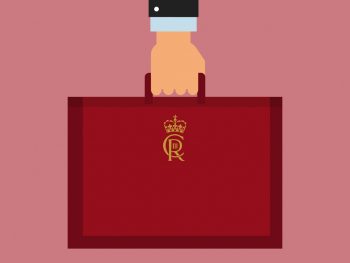Spring Budget 2024: Main points for fleets and industry reaction
Chancellor Jeremy Hunt has delivered the last Spring Budget before a general election. We look at the main points for fleet operators.

The Spring Budget contained few major announcements for fleets
The Spring Budget, seen by many as ‘make-or-break’ time, unveiled a raft of tax and spending plans in a bid to woo voters ahead of a general election.
It was the Chancellor’s fourth fiscal event, coming just over three months after his 2023 Autumn Statement, but contained few major announcements for fleets.
Fuel duty freeze extended
The Chancellor confirmed that fuel duty will remain at its current rate and be frozen for the next 12 months in the Spring Budget.
In a much-anticipated move, Jeremy Hunt told Parliament that the Treasury will maintain the current 5p a litre fuel duty cut introduced in March 2022 and keep the duty freeze – now in its 14th year – to support drivers and the economy at large.
The move has been much welcomed by the fleet sector, although some said duty should have been cut further. Others said it was disappointing that the Chancellor did not go further and introduce a VAT reduction on public charging for electric cars.
More details are here.
Full expensing to be extended to rental and leasing sectors
Following months of lobbying by the leasing sector, the Chancellor committed to extending full expensing to leased assets.
The Government said that draft legislation would be published within weeks to extend full expensing to leased assets “when affordable to do so”.
First announced as a temporary measure in the 2023 Budget, full expensing replaced the previous Super-Deduction tax relief for qualifying equipment and machinery including fleet vans/trucks – but not cars. It was made permanent in the 2023 Autumn Statement, but the rental and leasing sectors were excluded from claiming the powerful investment allowances.
According to the BVRLA, it could unlock an additional £1bn worth of investment into low- and zero-emission commercial vehicles.
More details are here.
Lack of Budget support for EVs slammed by many

Despite calls from many, there were no new measures to incentivise EV take-up
The Chancellor has been called out for missing opportunities to provide fairer taxation on charging and to incentivise consumer purchases of EVs.
Despite the lobbying from prominent stakeholders, the Chancellor failed to address current “unfair” and “illogical” public charging rules whereby drivers using public charge points have to pay 20% VAT, compared to 5% for those able to access home chargers.
There was also a distinct lack of measures to incentivise consumer purchases of electric vehicles – leaving Vauxhall managing director James Taylor saying the Budget “has not delivered the acceleration needed to stop the UK’s transition to electric vehicles from stalling”.
Others decried the absence of actions to support charging rollout and fleet electrification – in particular for van operators.
More details are here while the response from the BVRLA-led Zero Emission Van Plan Coalition is here.
No news on Benefit-in-Kind rates past 2027/28

Fleets will already have cars on order that will still be on the road after the current tax bands expire
The Budget didn’t contain any news on Benefit-in-Kind rates past 2027/28, leaving fleets in the dark on future tax rates.
The current rates were set out in the 2022 Autumn statement 2022 when the Chancellor announced that the Government would start raising company car tax rates for electric vehicles from 2025/26, but with yearly increases capped at 1% until 2028 to keep rates low. The rate for 2027/28 will be 5%.
Caroline Sandall-Mansergh, consultancy and channels development manager, said: “We eagerly await an update from the Government to ensure we can factor these into our planning as early as possible.”
Octopus Electric Vehicles has also called on the Government to provide clarity on what company car tax rules will look like in the future.
Fiona Howarth, CEO at the electric car salary sacrifice specialist, said: “Salary sacrifice has supercharged the UK’s transition to electric driving, making electric cars cheaper than their petrol equivalents. Clarity around low Benefit-in-Kind tax rates for EVs beyond 2028 is critical for consumer confidence and to keep up the momentum in the EV roll-out. Not clarifying the rates in the Budget is a missed opportunity.
“Following the recent 2035 rollback, drivers need clarity, not confusion, on tax rules to help make the decision to switch to an EV. Salary sacrifice is the most cost effective and easiest way to get a new EV, and demand has been through the roof. “
And Matthew Walters, head of consultancy services and customer value at ALD Automotive | LeasePlan UK, added: “Publishing company car tax bands beyond April 2028 is already important. Businesses are still enduring extended delivery times for new vehicles, and longer lifespans are increasingly common. Some fleets will already have cars on order that will still be on the road after the current tax bands expire.”
Employee National Insurance cut from 10% to 8%
As expected, the Chancellor confirmed the core national insurance contribution rate will be cut by 2 percentage points from 10% to 8% from 6 April 2024.
This comes on top of a 2p cut in the autumn statement in November, which reduced the rate from 12% to 10%.
Matthew Walters at ALD Automotive | LeasePlan UK said: “With household finances under continued pressure, we welcome any policy changes which lighten the financial burden on consumers. Reducing Class 1 National Insurance Contributions (NICs) – paid on income – by 2% points will help employed and self-employed workers keep more of what they’ve earned.
“Although it’s true that NIC reforms will reduce the advantages of opting into salary sacrifice schemes, the effects are marginal. These schemes enable employees to lease a new car through their employer, fund it with their pre-tax income, then pay tax and National Insurance on the remainder, typically reducing their tax bill.
“Cutting NICs on income marginally reduces those savings, but the bigger picture is it will leave drivers with more money in their pockets in the first place. With retail demand for new cars waning, that’s good news.”
Other points:
- OBR expects the economy to grow by 0.8% this year and 1.9% next year – 0.5% higher than their autumn forecast. After that growth rises to 2%, 1.8%, and 1.7% in 2028.
- Inflation expected to fall below the Government’s 2% target in just a few months’ time, down from 4% in January.
- VAT registration threshold to rise from £85,000 to £90,000 from 1 April – expected to bring tens of thousands of businesses out of paying VAT altogether.
- Funding package for R&D and manufacturing projects across the life sciences, automotive and aerospace sectors. This includes almost £73m in combined government and industry investment for automotive R&D projects to support the development of electric vehicle technology.
- No changes to Insurance Premium Tax (IPT) – the RAC said cutting IPT would have helped “keep spiralling motor insurance premiums in check”.
- No changes to Vehicle Excise Duty reforms for electric cars. Electric cars are still due to start paying VED from 2025, despite many having called for this to be scrapped, and will no longer benefit from the Expensive Car Supplement exemption.
Fleet sector general reaction

Paul Hollick, chair, Association of Fleet Professionals
Paul Hollick, chair, Association of Fleet Professionals
“There’s some mixed feelings here. In a lot of ways, one of the wins this government can claim over the last 14 years is its commitment to electrification, and the impact that its policies have had on the fleet sector in terms of moving to zero carbon emissions have been marked and dramatic.
“However, the truth is that more assistance in this area is now required – especially when it comes to van electrification where there are fundamental issues to overcome as well as the need for a further increased rollout of charging infrastructure – and there was no sign of that help arriving at any time soon.
“While minor moves such as the continued reduction of fuel duty is welcome, we very much hope to see more from whoever is in power following the next general election.”
Ian Hughes, CEO, corporate and consumer division at Zenith

Ian Hughes, CEO, corporate and consumer division at Zenith
“We were pleased to see motorists protected in the latest Budget, with no new tax burdens and rates of fuel duty held at the current levels for the next 12 months, meaning the overall outlook remains positive.
“However, this was a missed opportunity for government to further drive forward the EV transition. Our latest EVXperience report showed that new drivers of EVs have less confidence than the first iteration of adoptees.
“The Budget was a chance to support a greater number of future EV drivers by committing further funding for the van grant and reducing the VAT burden for those relying on the public charging network.”
Adam Hall, director at Drax Electric Vehicles

Adam Hall, director at Drax Electric Vehicles
“Businesses/drivers will be disappointed to hear that the Chancellor hasn’t listened to calls for public charging VAT cuts. Decreasing from 20% to 5% would’ve been a helpful step in the right direction for current and soon-to-be EV owners. We would have liked to see this support from the Government to increase the affordability of EV charging across the UK, especially for those who can’t plug in at home or don’t have access to charging facilities at work.
“While investment packages in cutting-edge technology and manufacturing is valuable, there must be greater emphasis and understanding of the challenges that EV drivers and fleets currently face. With the launch of the Zero Emissions Van Plan, presented to MPs last week, many would’ve expected further measures to be set that acknowledged electric van concerns. To futureproof the EV transition for commercial vehicles, the Government should consider the removal of regulatory barriers for the largest electric vans and a review of public charging accessibility for vans using the Public Charge Point Regulations 2023.
“Accessible and convenient charging infrastructure in the right areas is also essential. In the past 12 months, over 18,000 charge points have been added to the UK network, but how many are in pockets of the country that don’t currently have easy access? It’s crucial for fleets/drivers that these areas see an increase in charge point coverage to ensure safe and confident driving across the country.”
David Bushnell, director of consultancy and strategy, Fleet Operations

David Bushnell Fleet Operations
“In the midst of a pivotal election year, the unveiling of the UK Chancellor’s Spring Budget has inevitably garnered widespread attention, not least from the fleet transport sector.
“With political tensions high and economic forecasts under keen scrutiny, it will be regarded by many as an indicator of the government’s policy priorities and financial strategies.
“The decision to cancel the planned increase in fuel duty, effectively freezing it at its current rate, must be welcomed. The move – in the wake of the biggest monthly rise in fuel prices in five months in February – offers a financial reprieve for the fleet sector amidst considerable economic pressures and the burgeoning challenges of operating fleets in the current economic climate.
“However, whilst there will be no additional fuel cost burden for operators of petrol and diesel vehicle fleets in the short term, it is important to highlight that while this measure aids financial planning, it does little to advance the broader objective of transitioning to more sustainable modes of transport.
“The long overdue promise of making full expensing apply to leased assets will help support investment into low- and zero-emission commercial vehicles, but the Government has missed a crucial opportunity to encourage electric vehicle adoption, especially electric vans, by failing to reduce the VAT rate on public charging.
“The cost of running EV fleets, particularly those that rely on public charging stations, remains a significant barrier to adoption. A reduction in VAT on public charging could have served as a strong incentive for fleet operators to accelerate their shift to electrification, aligning with the UK’s ambitious environmental targets.
“The Government’s commitment to environmental sustainability and reducing carbon emissions is well-noted, but the actions to support these commitments, especially in the context of fleet transport, require more work.”
Philip Nothard, insight director, Cox Automotive

Philip Nothard, insight director, Cox Automotive
“The Budget will come as a disappointment to both current and would-be EV drivers and automotive generally.
“We had hoped that the Government would address the VAT discrepancy between domestic and public charging. Steps taken in that regard would have been both affordable and logical.
“Having said that, measures that put money back in the pocket of the average consumer, as the fuel duty freeze and national insurance cut do, clearly help our sector. This was a budget designed to win votes in an election year, but one with zero incentives to further push zero-emission motoring.”
Peter Golding, managing director, FleetCheck

Peter Golding, managing director, FleetCheck
“This was a political Budget concentrating on giveaways to voters, which is perhaps understandable given the proximity of the general election and the current state of the polls. However, there was very little in there for businesses of any kind and especially for those operating fleets, except for the ongoing fuel duty reduction freeze.
“It really does feel as though our sector is now waiting for what now seems a likely change of government, and the opportunity to engage the new administration in dialogue about what we would like to see from them in terms of future developments in all kinds of areas from electrification to driverless cars.”
Paul Holland, managing director for UK/ANZ Fleet, Fleetcor

Paul Holland, managing director for UK/ANZ Fleet, Fleetcor
“All in all, the budget held few surprises – retaining the fuel duty cut was welcome but predictable and the investment in energy security is too little, too late.
“It is looking increasingly as though the UK’s fleets are on their own when facing the challenges of high fuel prices and a lack of leadership and strategy on EV transition.”












